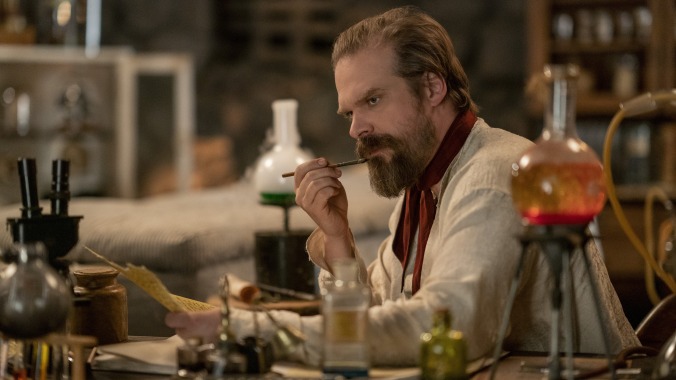Frankenstein’s Monster’s Monster, Frankenstein is a bite-sized bit of theatrical satire


There’s plenty to admire about Frankenstein’s Monster’s Monster, Frankenstein, not the least of which is its brevity. Netflix, after all, is a great offender in the “too much content” era in which we live—they gave 13 episodes to an adaptation of Green Eggs And Ham, for Christ’s sake—and we wouldn’t be surprised if they’ve been pitching the creative team of Frankenstein (director Daniel Gray Longino, writer John Levenstein, and star David Harbour) on more episodes. Somehow, though, Frankenstein’s Monster’s Monster, Frankenstein remains, for now, at least, a standalone comedy special clocking in at 28 minutes. May the gods bless it for that.
It begins with Harbour, the veteran actor best known as Stranger Things’ rage-prone chief of police, introducing the mockumentary as an exploration of the career of his late father, David Harbour Jr. (also played by Harbour), a master of “televised theatricals.” Specifically, Harbour wants to mine a screening of his father’s final play, the ornate, overwrought Frankenstein’s Monster’s Monster, Frankenstein, for clues into his temperament and parental absence. The younger Harbour has even re-created his father’s old office (and his chili recipe) to help dredge up memories from the man’s old colleagues, including a producer (cult horror veteran Mary Woronov) and an agent (Oscar nominee Michael Lerner). Through it all, we routinely hop between interviews of Harbour Jr. in the declining years of his career and vintage footage of the play, the head-scratching plot of which appears to confound its very actors as they stumble through its lunkheaded blocking.
As one might expect of Levenstein, an Arrested Development alum, that’s about a season’s worth of story—a lot to be explored in 28 minutes. A brisk pace and general disinterest in lingering on Harbour’s myriad revelations helps in that regard, as does the aesthetic itself, which is spot-on in its re-creation of the chintzy, self-serious televised mysteries of the ’60s, ’70s, and ’80s. It’s those scenes, carried in large part by Kate Berlant’s breathy schmacting, that resound as the project’s best—Longino not only captures the dull color saturation, but also the endlessly creaking floorboards, abrupt commercial breaks, and mishaps (like a door that bounces back open during a character’s flashy exit) that tend to plague live performance. Levenstein also feels especially versed in the details of these texts, having filled his play-within-the-mockumentary with useless characters like an innocent preteen and a mother, both of whom exist only to die in dramatic ways. “Unfortunately, there’s no cure for death. I don’t know if there should be. Life would be a little less rich,” a visiting doctor offers.
There’s plenty of comic pontification in Frankenstein’s Monster’s Monster, Frankenstein, much of it serving to inflate the actor’s own sense of self-importance. And that’s ultimately what the special is satirizing; just as the actor tries to pretend that what they’re doing carries some spiritual truth, so, too, do we often try to import a sense of mystery into the flawed characters of our own lives. In the end, though, people are often much simpler than we’d like to realize, driven by ego, resentment, and a deep, abiding misery. As that theme crystallizes, though, Harbour’s numerous speeches can irk in much the same manner as those which he’s parodying. His Harbour Jr. is funny but exhausting, though you can’t deny the approach fits the character.
That said, it’s a blast to see Harbour embrace his comic side, especially when paired with Berlant, who’s consistently proven herself to be a fierce chronicler of the obsessed and eccentric—lest you forget, she plays the unnerving owner of Jim Davis’ Garfield mansion in I Think You Should Leave. It’s unclear how much improv was unfolding on set, but many of the special’s best moments feel off the cuff, specifically Harbour and Berlant’s turns on The Actor’s Trunk, a show hosted by Alfred Molina’s guru that tasks guests with making actorly, up-their-own-ass magic from the objects contained in the eponymous trunk. Harbour reimagining a tennis racket as a “cane of sorts” is exactly the kind of stupid thing you’d see in a low-level acting workshop.
Frankenstein oscillates between so many bits, asides, moods, and ideas that it can sometimes feel like a blur, and its ending arrives with an abruptness that doesn’t feel earned. But, despite the ego of the theater being a familiar target, the special nevertheless feels fresh in both the specificity of its satire and its surprising cast, several of whom—Harbour and The Americans’ Alex Ozerov, specifically—haven’t really had much of a chance to flaunt their chops in such a silly, low-stakes endeavor. That’s exactly the appeal of the silly, low-stakes endeavor, however, and Netflix would be wise to throw its considerable budget at more of them.